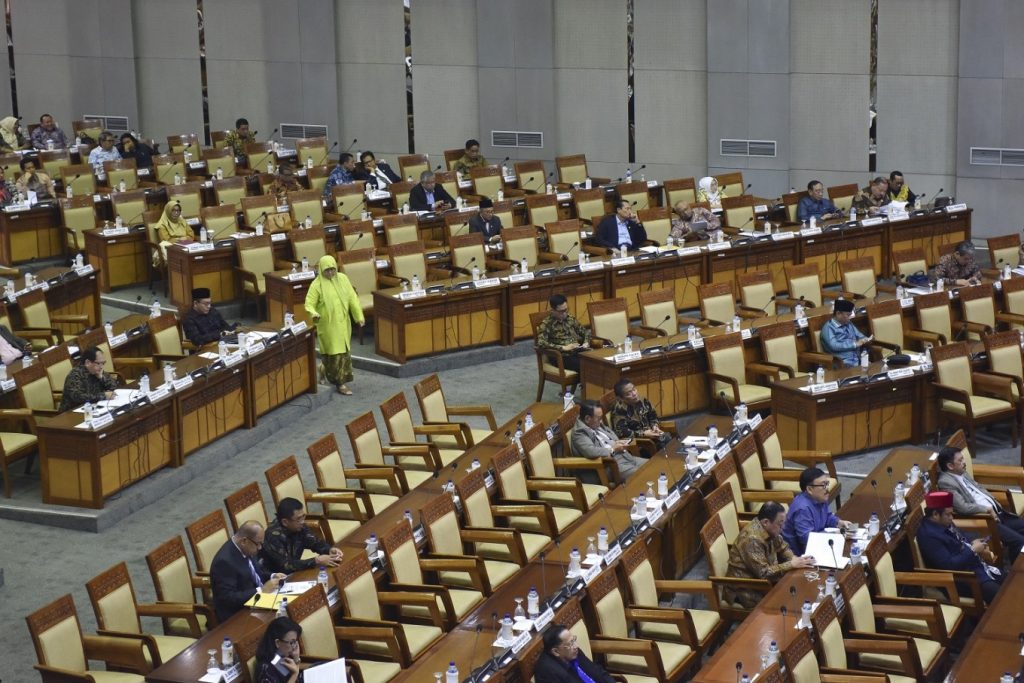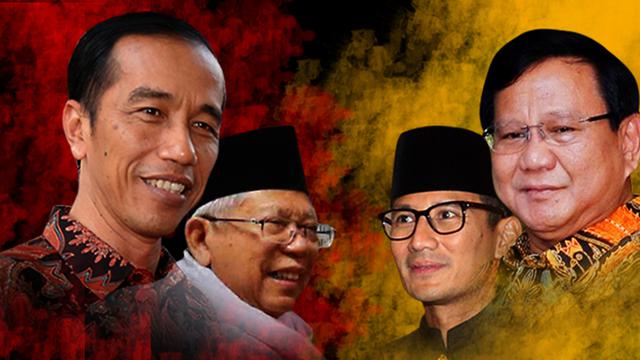
All set: House of Representatives members get prepared to attend a plenary meeting at the House in Senayan, Central Jakarta, on July 27, 2017. (Antara/Wahyu Putro A.)
Many believe that, during the election years, politicians and bureaucrats will be too busy thinking about the elections to make any big decisions, enact major policies or issue any important laws.
In the context of the multiparty presidential system Indonesia has adopted, this view makes sense. Under this kind of political system, the president must be able to build a stable coalition of parties in a fragmented political environment to be able to govern effectively.
When a presidential term ends, however, these coalitions tend to dissipate or at least their ties become ambiguous as each party tries to ensure that it is backing the right horse in the coming electoral race. As a result, making new policies and drafting new legislation presumably become more difficult.
Looking back at the last election, this was not necessarily the case; many important policies and laws were made in the runup to and during the election. One could even argue that election years actually produce more policies and laws.
Let’s take a look at 2014. Throughout that year, then-president Susilo Bambang Yudhoyono’s outgoing government issued 100 government regulations and 164 presidential regulations up to its last days in power. These are notable figures compared to the previous non-election years.
In particular, then-coordinating economics minister Hatta Radjasa pushed a very significant policy on the mineral export ban in 2013 that was issued in January 2014 in the midst of the electoral campaigns.
Although this policy was mandated by law, few predicted that the government would take such a strict stance, which caused a tremendous negative impact on the mining industry and the national economy. It should also be noted that Hatta was a vice presidential candidate in the 2014 election.
The same can be said about laws. Twice as many laws were issued in 2014 (42, to be exact) compared to the previous year. Many of these laws were important legislation that had stagnated for years, including laws related to halal products, insurance, intellectual property and geothermal energy.
These are laws that have significant impacts on businesses and the public, but they went largely unnoticed when they were promulgated because of the massive attention on the presidential election.
True, little more than half of the abovementioned 2014 laws were issued after the legislative election, but even in early 2014 and in 2013, when legislators were supposedly busy campaigning, there was no visible slump in the number of laws issued when compared to previous years.
The situation was no different leading up to the 2009 elections toward the conclusion of Susilo Bambang Yudhoyono’s first presidential term, so it appears that this trend exists irrespective of an incumbent’s eligibility to run for office.
Hence, it would be mistaken to think that the elections trigger a slowdown in regulatory decisionmaking, although it might seem so because the media and public debate focus on the candidates, political parties and other electoral issues.
But we should be aware that politicians and bureaucrats are able to maintain and achieve essential policy agendas with little public scrutiny beyond the electoral spotlight.
There are many important policies and laws that are pending. If we look at the legislative priorities in 2018, there are bills related to land use, water resources, the tobacco industry, alcoholic beverages, oil and gas, mining and palm oil that have important business, economic and social implications; not to mention bills on the penal code, sexual violence or wiretapping that may have significant impacts on the future and quality of Indonesia’s democracy.
True, the House of Representatives is generally known for its poor legislative performance. But it would be unwise to assume that bills that may still be pending in September, when the formal campaign period begins, will never be made into law in 2019. Our lawmakers may surprise you.
Instead, it may perhaps be even more likely that government regulations, presidential regulations and ministerial decrees are issued, because they are being prepared and formulated by officials who are not participating in the elections.
In the Indonesian regulatory framework, implementing regulations is all that matters, because they provide more clarity to the law and thus have a greater impact.
A government regulation on halal products and all related regulations, for example, are being drafted as a follow-up to the 2014 Halal Law. If the government fails to issue these regulations in the next few months, it will have to halt their drafting until after the 2019 presidential election.
Having said that, people must look beyond the reports that will dominate the media this year and next. Most headlines will be on the elections or related political issues, but this does not mean that there are the only current events.
More importantly, the government will keep on doing their work. Perhaps some of these will be reported in news that receive fewer clicks or in articles placed in sections “hidden” inside newspapers so they are harder to notice.
As part of managing public affairs, businesses should continue to closely monitor and follow policy and regulatory deliberations from sources beyond the media. Recent history shows many cases in which House members or the government has fast-tracked certain policies during election years.
This includes efforts to secure campaign funds by backing a particular business interest, gaining popular support for a policy to raise electability and last-ditch efforts to push through a policy while retaining enough influence to do so.
Thorough mapping of the various interests, needs and motivations of policymakers and other actors can provide better understanding of what bills or drafts might be accelerated or not. Keeping track of what is happening will go a long way toward navigating potential regulatory challenges ahead.
Anton Rizki Sulaiman is president director at Kiroyan Partners. The views expressed are his own.
Source: The Jakarta Post, April 16, 2018, page 7.


